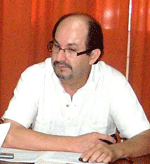Paraguay
Published on Thu, 2019-11-07 16:58
Paraguay has a history of “very low government revenue, generalized reluctance to pay taxes in a climate of corruption and strong opposition by enterpreneurs and high income earners to any increase in their fiscal contributions”, reports Decidamos, Campaign for Citizens' Expression. One of the few tax increases that the public accepts are the taxes on tobacco, as they generate revenue but also address a public health problem. Yet, a proposed law to increase taxes on tobacco to 40 percent was vehemently opposed by the producers and by former president Horacio Cartes (2013-2018), who owns the biggest tobacco company in the country. |
Published on Thu, 2016-09-01 18:57
Paraguay faces strong challenges in meeting the Sustainable Development Goals (SDGs), with their focus on reducing inequalities and their complex links to production and growth. The right to health has not been met yet and social protection is still not a right for everyone. Even if there is a systematic improvement of the indicators of the past decade, these positive results were achieved only after years. After more than a decade of economic growth, lost opportunities in terms of welfare, the lack of productive transformation and tax justice place the country in an unfavourable position to meet the goals of reducing inequalities and ensuring socially and environmentally sustainable growth. Social protection is still a right to aspire to. Current contributory programmes are fragmented, incomplete and have a low level of coverage. The coverage of non-contributory programmes has increased significantly in recent years, but the lack of comprehensiveness hinders the possibility of substantial impact in reducing the risks that people face throughout their lives. |
|
Paraguay faces strong challenges in meeting the Sustainable Development Goals (SDGs), with their focus on reducing inequalities and their complex links to production and growth. The right to health has not been met yet and social protection is still not a right for everyone. Even if there is a systematic improvement of the indicators of the past decade, these positive results were achieved only after years. After more than a decade of economic growth, lost opportunities in terms of welfare, the lack of productive transformation and tax justice place the country in an unfavourable position to meet the goals of reducing inequalities and ensuring socially and environmentally sustainable growth.
|
| Source: . Published on Fri, 2013-05-31 00:00 |
|
Lentos avances hacia los ODM
<br>
Como firmante de la Declaración del Milenio, el Estado paraguayo está comprometido a cumplir con los Objetivos de Desarrollo del Milenio para 2015. El hoy ex presidente Nicanor Duarte Frutos (2003-2008) reiteró ese compromiso, y su sucesor Fernando Lugo (2008-2012) lo incluyó explícitamente en sus dos principales programas: el Plan Estratégico Económico y Social 2008-2013 y la Política Pública para el Desarrollo Social 2010-2020.
|
Published on Fri, 2012-11-30 06:50
“The social contract was broken” in Paraguay by the “parliamentary coup” that ousted President Fernando Lugo on 22 June 2012, informs Decidamos, a campaign for citizen rights, in its contribution to the Social Watch report 2013. |
| Source: . Published on Fri, 2012-09-14 08:12 |
| Source: . Published on Mon, 2012-01-16 10:26 |
|
The development models implemented in the country have failed to meet the population’s needs. The environment is still being exploited with no thought for the future; inequalities among the different sectors of the population are getting worse. What is needed is a new development plan that enables a better coordination between the State, the organizations of civil society and the market and at the same time lays anew the country’s foundations to benefit the good of all. It means moving on from making protests to making proposals and showing that if everyone participates in the effort, it is possible to build a better country.
|
Published on Tue, 2011-08-16 09:09
Source: Campaña por la Expresión Ciudadana The telecommunications bill that is currently before the Paraguayan Parliament does not establish media communications as a universal right of all citizens but considers it a product in the market place. According to Rubén Ayala, the coordinator of the Association of Community Radio and Alternative Media (Voces Paraguay), in a statement on the portal of the Campaign for Citizens Expression (Campaña por la Expresión Ciudadana), the focal point of Social Watch in the country, one of the motives behind this restrictive proposed legislation is that it would limit the power of community radio stations and civil society organizations and prevent them from obtaining finance by selling advertising. |
SUSCRIBE TO OUR NEWSLETTER










